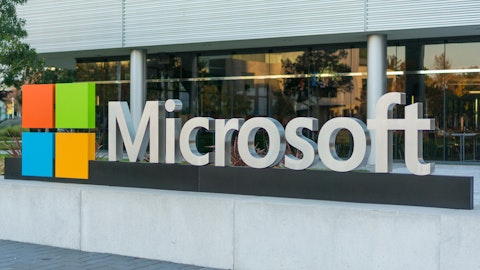So obviously, if we need to stop doing that product, no one really cares, but it’s just one example of the way, sometimes when you’re really disciplined about allocating capital thoroughly, all the way down to new products and responding accordingly. You can wind-up having to change our business mix there. Obviously, more significant products that matter much more of a real economy like mortgage where, the layering on of the operational risk in the way it’s being proposed, especially if some of the other beneficial elements of the proposal don’t come through, you’re once again, making the product even harder to offer the homeowners, so we’ll see, we’ll see what happens.
Jamie Dimon: And I would just add to that even though the product doesn’t make money, you might do it for clients who are great clients. The advantage by-product, by client by effectively business mix and further adjustments. Whilst these loans don’t make sense for your balance sheet as a whole, almost anyone. We just need to keep up to recognize that and we just managed through all the various complications here and you’re going to the other do.
Ebrahim Poonawala: Got it. Thank you.
Operator: Next we’ll go to the line of Mike Mayo from Wells Fargo Securities. You may proceed.
Mike Mayo: Hi. I had another question on Vice-Chair Bar’s speech from this week. I do except the capital ratios do go up 20% for you. And perhaps others to what degree would you think about changing your business model in terms of remixing, will you do business repricing or simply removing activities that used to do it. Kind of ironic, or maybe it’s not ironic though, Apollo hit an all-time stock price high at the same week as to speech. So does that — how much business they have JPMorgan or the industry capital ratios to go up as much as potentially proposed.
Jamie Dimon: Yes. Before Jeremy answer that question, this is great news for hedge funds, private-equity, private credit, Apollo, Blackstone and the gas industries.
Jeremy Barnum: Exactly. I was going to say Mike, yes to everything. So, rename, re-pricing, yes, definitely. To the extent that we have pricing power and higher capital requirements, mean that we’re not generating the right returns for shareholders, we will try to reprice and we’ll see how that sticks and how that flows into economy and how that affects demand for products. And if the repricing is not las, successful then in some cases, we will have to remix that means getting out of certain products and services. And as Jim points out, that probably means that those products and services we have the regulated perimeter and go into elsewhere and that’s fine, as Jamey pointed out, those people are clients and I think that point was addressed also in Vice-Chair Bar speech. So, but in our traditionally, having risky activities we have a regulated perimeter has had some negative consequences. So these are all important things to consider.
Mike Mayo: All right. And separate question, I appreciate the Investor Day. It gives a little bit more color on the degree that your investment may or may not pan-out. We are still watching that closely. Having said that you’ve just increased revenue guidance by $10 billion for NII, between this quarter and the first quarter without changing expense guidance by even one dollar. Are you tempted to spend a little bit more, why not then more if you’re gaining share and I’m not saying you should. I’m just wondering like, aren’t you tempted to do so. You’ve $10 billion more revenues, you’re not spending one dollar more of expenses like why not?
Jamie Dimon: Mike, let me get this right, you’re actually complaining that our expenses aren’t high enough, is that right?
Mike Mayo: Wait, just to be clear, it’s just a part of the question I asked for two years, going back, whether or not, but.





